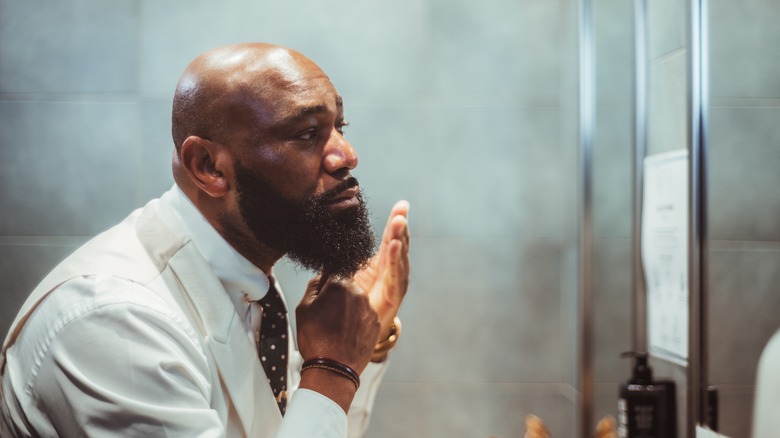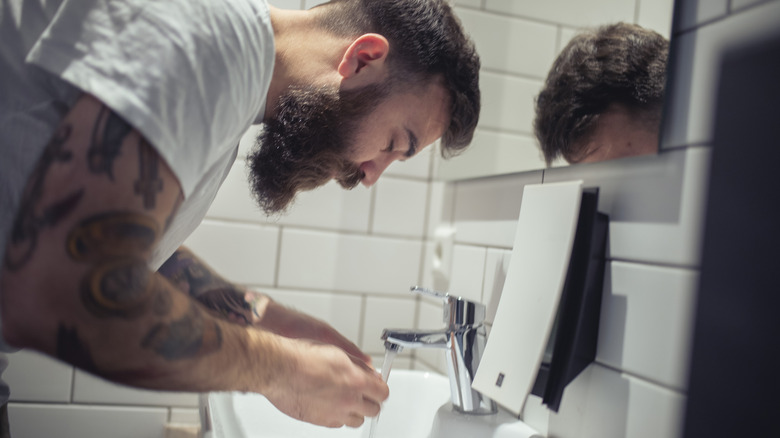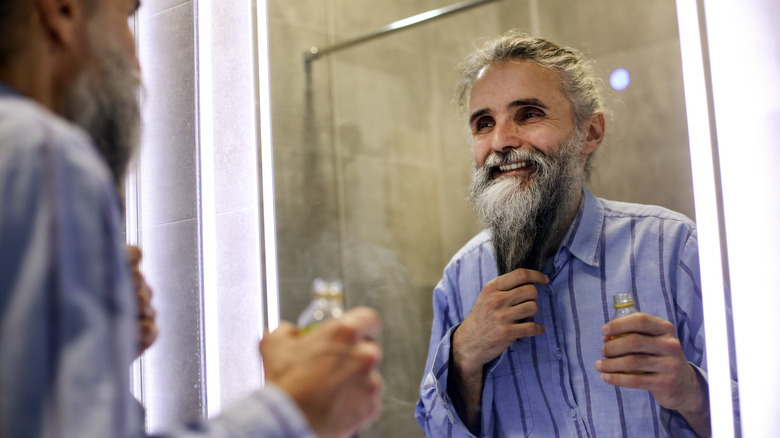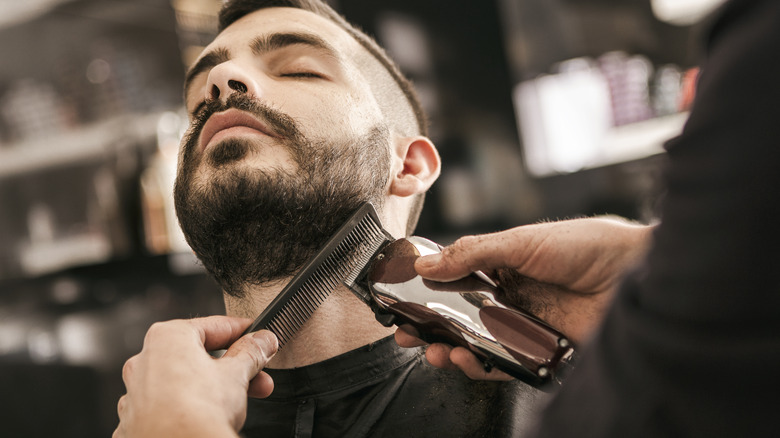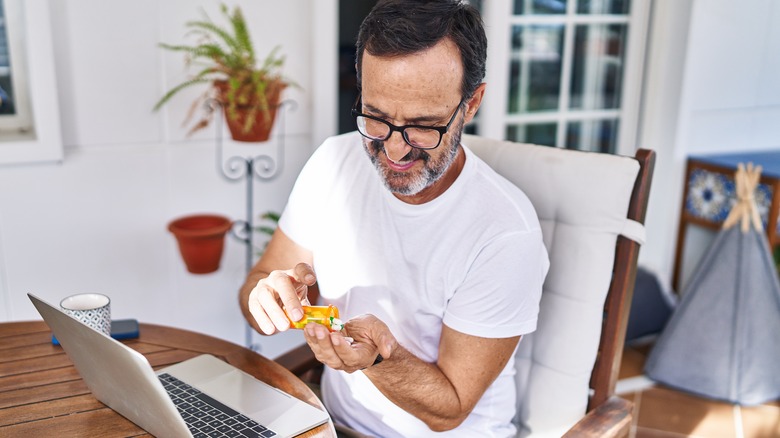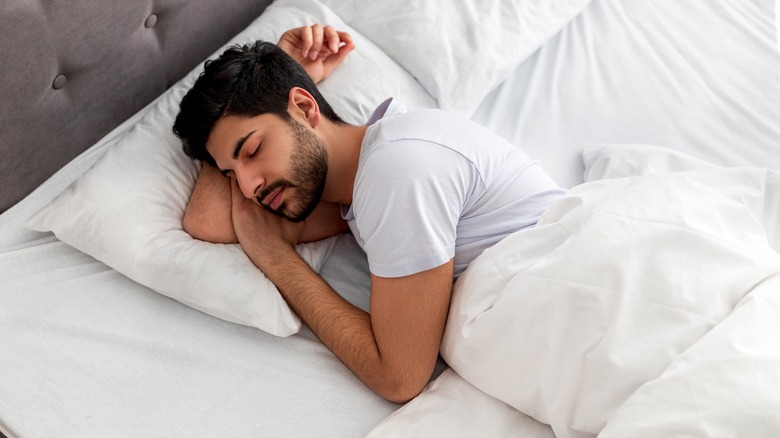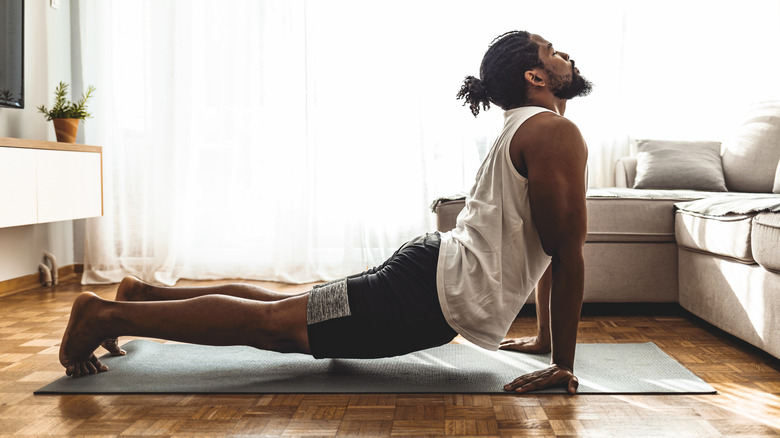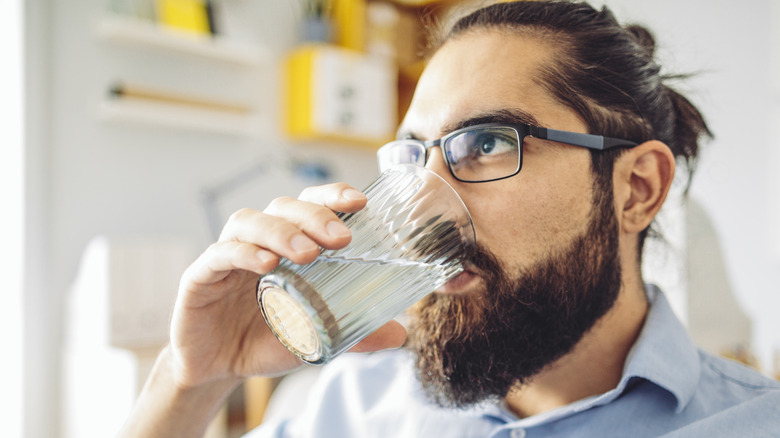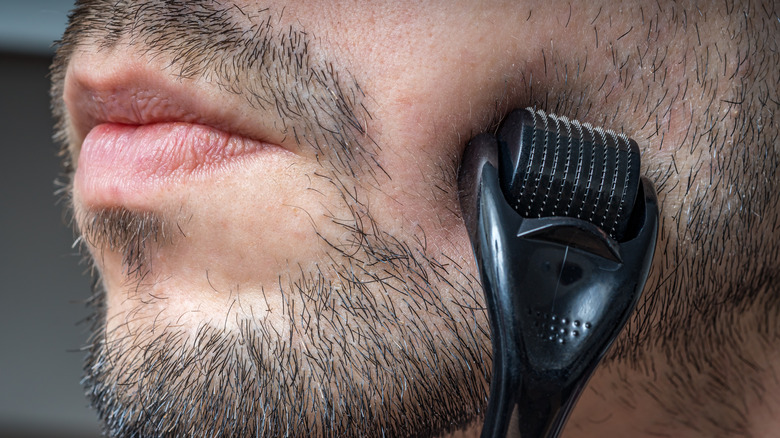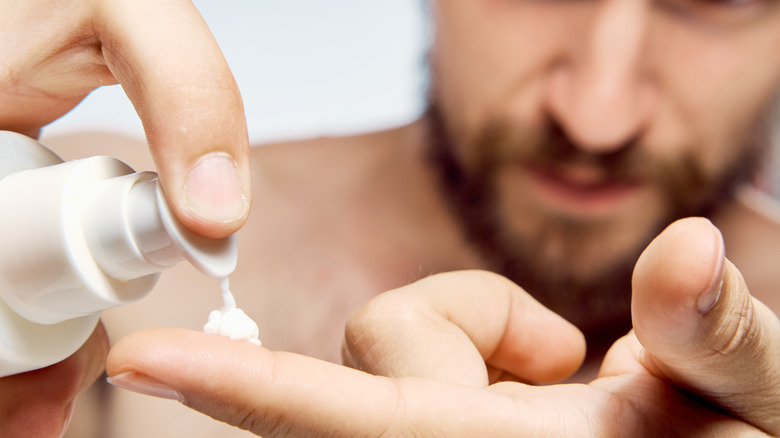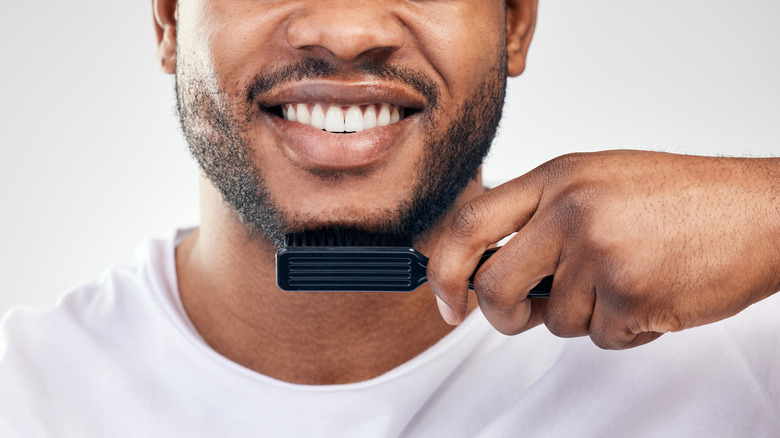Ways You Can Grow A Beard Faster According To Science
You were watching Vikings on Netflix, and their beards had you feeling envious. Your beard has been growing out for the last few weeks, but you haven't seen much movement. Now you're starting to wonder if there is a way to get a thick, full Brock O'Hurn beard.
The first thing to remember is that age will be a factor when it comes to that beardly look. Younger individuals will have more difficulty getting that full beard since testosterone (the male sex hormone) is a critical component in beard development. Many people find they can grow a full beard until their late 20s. You also need to look at your genetics. Some ethnicities grow facial hair much easier than others. If your dad has a nice, full beard, chances are you will, too, with a bit of patience and the proper care.
Beyond just leaving your beard to fate, you can do a few things to increase the chances of getting your beard growing faster. You'll be competing in those beard competitions in no time flat.
Skin care is key to beard growth
Full and luxurious beards don't just happen overnight. Patience is vital when it comes to waiting for your beard to grow. The road to getting your beard to grow faster and fuller starts with taking care of your skin.
The American Academy of Dermatology Association (AAD) recommends washing your face daily. Board-certified dermatologist Anthony Rossi, MD, FAAD, told AAD that washing your face is the first step in removing dead cells and pollution that can build up. It's also essential to use a gentle cleanser designed for your specific skin type. For example, Dr. Rossi noted that you'd want to use a cleanser with salicylic acid if you have acne-prone skin.
Consider exfoliating your skin to help remove dead skin and reduce inflammation. Board-certified dermatologist Shari Marchbein noted in Allure, "An over-the-counter benzoyl peroxide wash daily and gentle scrub that contains salicylic or glycolic acid, such as St. Ives Blackhead Clearing Green Tea Scrub can be helpful."
Make sure to moisturize your beard
Caring for your skin ensures those hairs can pop through how they need to, and that nothing will be holding them up. Make sure to give the hairs themselves a bit of TLC too. In an interview with the AAD, dermatologist Dr. Anthony Rossi points out it's essential to hydrate and moisturize your skin and hair using a moisturizer or beard oil.
There are a lot of different moisturizers out there that you can try to promote a thick, healthy beard. Rather than running to the store, look in your pantry. Research has shown that olive oil is an excellent source of fat for growing a thick beard. It helps moisturize and strengthen hair fibers, leading to less breakage, according to Healthline. Additionally, a randomized controlled trial in Natural Product Communications showed that consuming a bit of olive oil, in addition to saturating your beard in it, could give you the bonus of upping your testosterone levels.
Dr. Rossi cautions against skipping this step even if you have oily or acne-prone skin because the moisturizers will keep the skin from getting dry and flaky. For those just starting their beard journey, protect your facial skin using SPF until the hair completely covers it.
Pamper your beard rather than shave it
Growing your beard isn't a sprint. It's going to be a marathon. It will take months, perhaps even years, to get the length and fullness you crave. Therefore, be patient with your beard and avoid shaving it off.
You might have heard the myth that shaving makes your hair grow thicker. This is simply untrue, according to Mayo Clinic. Shaving will make the facial hair feel coarse and stubby, but it doesn't affect the overall thickness or make it grow faster. In fact, shaving your beard will make the overall process of getting to the length you crave take longer. So, throw those razors in the trash for now.
Rather than trying the shaving method, grab your clippers and scissors. Barber Elliot Forbes told GQ Magazine, "Growing a beard takes plenty of time, patience and dedication. There's more to it than letting things grow wild. Trimming your beard is a key part of the growing process." During your journey, carefully clip any stray hairs or trim split ends. Try shaping your beard to keep everything neat and tidy. Forbes also recommends getting a high-quality beard trimmer, stating, "Spend a bit more if you can because cheaper ones often miss hairs."
Eat foods that promote hair growth
Hair growth anywhere on your body starts from the inside out. While genetics can determine how many follicles you have and how thick they are, you can give them the best chance of success by ensuring your diet is full of foods that promote hair health and growth.
Research in Dermatology and Therapy stated, "Micronutrients are major elements in the normal hair follicle cycle, playing a role in cellular turnover, a frequent occurrence in the matrix cells in the follicle bulb that are rapidly dividing." Additionally, the research found a relationship between low vitamin D and hair loss. Therefore, it could be beneficial to include foods rich in vitamin D in your diet, like salmon, tuna, eggs, and dairy.
Testosterone also plays a prominent role in the growth of your facial hair. According to Medical News Today, testosterone naturally decreases with age, so add foods to your diet that can boost your testosterone. For example, a 2012 study in The Medical Journal of Tikrit University showed consuming ginger increased testosterone by a "significant" amount. Pomegranate, oysters, and fatty fish were also noted to help to give testosterone a pump when eaten regularly.
Try supplements to eliminate vitamin deficiencies that hinder growth
Keep your body balanced by ensuring you have enough vitamins and minerals to support healthy nails, skin, and, of course, hair. Several different vitamin deficiencies are known to play a role in hair loss. Research published in the Journal of Steroid Biochemistry and Molecular Biology showed that vitamin D receptors are vital for hair growth, and a receptor malfunction can lead to hair loss. Taking a vitamin D supplement can help keep your levels optimal and ensure your receptors are working properly.
In addition to vitamin D, research in Dermatology and Therapy showed that deficiencies in riboflavin, biotin, folate, and vitamin B12 have been associated with hair loss. However, it was also noted that biotin deficiencies were extremely rare and typically due to genetics. The research further clarified that many products supporting hair growth contain more than the recommended dose of biotin needed.
Vitamin C isn't just for helping with colds and flu; it's good for your hair, too, according to CNet. This vitamin is responsible for helping to balance out the free radicals in our bodies. It can also help convert iron into a form easier absorbed by the body, according to Michigan State University. You might also want to consider supplementing with vitamin C to boost your collagen production.
Work on your workout routine
Exercise is good for the overall health of your body, which means it's good for your beard. As hair transplant surgeon Dr. Fuat Yuksel told Live Science, "Your hair follicles will benefit from increased blood circulation and increased oxygen in the blood cells. Healthy hair follicles will allow your growth phase to be longer. Therefore, the hair will have more time to grow." This theory works for the hair on your head and your chin. However, this doesn't mean you can hit the gym a few times a month. Ensure you're hitting and possibly exceeding the Centers for Disease Control and Prevention's physical activity guidelines of at least 150 minutes per week.
It's also important to vary your workouts. Specific exercises targeted to grow your muscle mass can help boost your testosterone, but cardiovascular exercise gets your heart pumping. Consider varying the time of day you do your workout, too, especially for younger men. A 2015 study in the Journal of Family Practice found that testosterone levels naturally fluctuate during the day in healthy men, with testosterone levels being highest in the morning of those under 45. So working out during a non-peak time might help give your testosterone and beard an extra lift.
Prioritize getting enough sleep each night to promote hormone levels
Diet and exercise work to keep your body running smoothly, but they can't do it without enough sleep. You might not think sleep would affect your beard growth, but you'd be sorely mistaken. Not getting enough sleep at night can affect your testosterone levels, and there is research to prove it.
The Journal of the American Medical Association (JAMA) did a research study in 2011 of healthy men whose sleep was restricted for several hours. Results showed that testosterone levels decreased when men were in a sleep-restricted state. This was especially true during the hours of mid-afternoon and evening. They also saw a loss in vigor scores as sleep deprivation continued.
While the study didn't clarify the reasoning for the decrease in testosterone levels, an additional study by the Journal of Andrology found a link between rapid eye movements and testosterone secretion. That study stated, "We conclude that in young adult men, testosterone levels begin to rise on falling asleep, peak at about the time of first REM, and remain at the same levels until awakening." So sleep is linked to the secretion of testosterone, and not getting enough can have a fundamental impact on the growth of your beard. Therefore, the National Heart, Lung, and Blood Institute recommends getting about seven to nine hours of sleep each night for adults. Younger beard growers might need to get a few more Zs.
Destress for your beard
Stress can wreak havoc on all areas of your life, including your body. A little bit of stress here and there isn't going to hurt you. But when you experience constant stress day in and day out, this increases the production of the stress hormone, cortisol, within your body. Not only can chronic stress cause mental health issues and weight gain, but it can also hinder your beard growth.
A 2021 study in Nature found that stress hormones inhibit the growth phase of the gene that governs the hair follicle stem cell. This means the hair is in a longer-than-normal resting phase, so the hair growth cycle is stunted. When the growth is restricted, you might experience patchy growth on your head and less fullness in your beard. But it's not only the follicle-growing phase that's affected by chronic stress. Your hormones also respond to stress, specifically testosterone. Research published in the Journal of Cellular and Molecular Medicine showed that stress can affect testosterone synthesis. The structure of specific cells' mitochondria was damaged in rats with chronic stress. Low testosterone can affect fertility and beard growth.
So, it's essential to work to de-stress your life by practicing stress management techniques like keeping a positive attitude, interacting with friends, and making time for hobbies, according to WebMD. You might also try yoga or meditation.
Keep hydration at the top of your list
While you can go a while without food, water is needed constantly. So, it should come as no surprise that dehydration can affect your hair and beard. According to Arlington Dermatology, hair requires moisture to be healthy, so without it, growth might stop. Even improper hydration can cause hair loss; therefore, to help your beard grow, you must ensure you are fully hydrated.
The Harvard T.H. Chan School of Public Health notes that men would do well to drink about 16 cups of water daily. While some might be water, you can count other fluids like coffee, tea, and juice. Professor of Epidemiology and Nutrition Walter Willet advised people to steer clear of sugary beverages. The professor noted that sugary drinks are harmful to health rather than working to keep your body hydrated.
Proper hydration isn't just to keep your beard growing and luscious. Per the Mayo Clinic Health System, water can help regulate temperature, protect organs, and lubricate joints. It also plays a big role in helping the body's systems flush waste. To stay hydrated, it can be good to drink water first thing in the morning, set hydration goals, and carry water with you.
Invest in a derma roller
It's essential to give some extra love to your beard to ensure that you're stimulating hair growth. Microneedling, using a derma roller, effectively promotes the hair follicles on your head and face. This process uses several needles on a roller to break the skin and stimulate the collagen, according to Healthline. The more collagen, the better, since you need those keratin proteins swarming the skin and telling your hair to grow.
Sometimes known as beard rollers, derma rollers for the beard follow the same basic principle as the one used on your scalp. A blinded study in the International Journal of Trichology reported that those with androgenetic alopecia, a common type of hair loss, reported better results using microneedling and a hair growth medication than just the medication alone. The AAD also noted that microneedling can be used alongside platelet-rich plasma treatments to help stimulate hair growth.
To get the most out of your derma roller for your beard, try going for a smaller size since they can typically be used more often. Additionally, ensure that your face and beard are clean to avoid opening your skin to bacteria. Healthline also notes avoiding acne and filling your cheeks with air to ensure the needles stay on the skin.
Consider over-the-counter minoxidil
You've been doing everything right in the beard department. Your diet and exercise routine have completely changed, and you've also tried the beard roller. Yet, you're still struggling with thin areas and not getting the growth you want to see. It might be time to give your beard a little pharmaceutical boost. Minoxidil is more commonly known by its brand name, Rogaine, and it's not just for your head. Minoxidil can help you fill in hair all over your body, including your eyebrows and beard.
Rogaine expands the blood vessels and makes the follicles bigger, a process known as vasodilation (via Healthline). This vasodilation allows users to get more hair growth that falls out much slower, meaning your beard looks fuller and thicker. While the mechanisms that make Rogaine effective might take years on the scalp, they can take just a few short months on beard hair. A 2014 study in The Journal of Dermatology found that those using a 2% lotion of minoxidil for eyebrow growth saw significant growth in just 16 weeks. A Drug Design, Development, and Therapy study also showed that minoxidil was superior for enhancing the look and growth of facial hair. Those using the 3% formula increased the hair count with statistically significant differences.
With that said, it does come with mild side effects like skin irritation or contact dermatitis. To avoid an itchy situation, it's essential to do a patch test.
Hormone therapy for a thicker beard
Testosterone plays a significant role in the growth of facial hair. According to Balance My Hormones, the testosterone bi-product dihydrotestosterone (DHT) prepares the beard hairs to grow and activates the oils within the face. Being low on testosterone can affect the growth and thickness of the hair.
Those with low testosterone might also experience other symptoms beyond slow beard growth, like reduced muscle mass, sex drive, and bone mass, per Medical News Today. With a doctor's approval, you might try testosterone hormone replacement therapy to increase the levels of DHT within your system through patches, gels, or injections. Just remember that it's vital to get the dosing right, because a buildup of DHT can lead to baldness.
Growing a fabulous beard isn't going to happen overnight. While facial hair grows faster than the hair on your head, it will take months and sometimes even years to get the fullness and length you desire. To speed up the process, you need to take care of your body and hair, finding and treating any deficiencies that can be working against you. You might also want to give your beard a little extra love by trying hair-growing medications and dermarolling.

